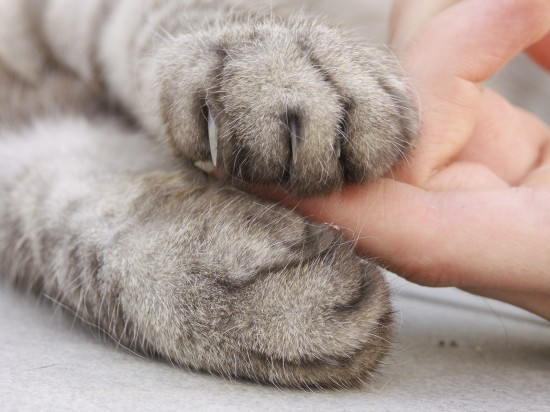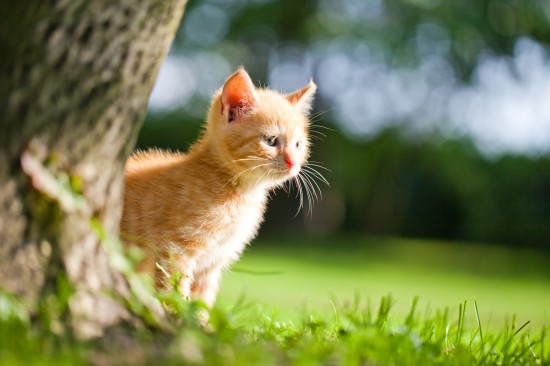

Cats are gorgeous creatures and they can keep owners amused for hours so knowing they are happy and healthy is really important. Cats usually love being petted and they are never happier than when they are sitting on a nice warm lap enjoying some quality time with people they love. These precious moments are a great time to give a cat a quick check over to see if there are any lumps, bumps or sores on their bodies without being too intrusive that is. Your cat will love the attention and not even realise what you're doing because they'll be purring their hearts out.
Giving your cat a monthly health check is a great idea although it should never replace a trip to the vet if and when needed. Your pet would need to see the vet at least once during the course of a year, not because they are unwell but to get their boosters and for the vet to just give them a “once over” just to make sure your pet is healthy and happy which is really important as they get older.
However, if you make a routine of checking your cat over at least once a month, it means you can pick up on a problem earlier rather than later. The result is that any condition or illness can be treated without delay which ensures your four legged friend gets better sooner. As cats get older, they really should see the vet every six months – but as an owner there is nothing to stop you giving them a health check in between the visits on a monthly basis.
Check your cat's ears is important and should be done on a regular basis so that you pick up on any problems which could include the following:
Ear mites can be a real problem and although they are not easy to spot, they leave a nasty reddish/brown discharge in a cat's ear. More often than not the irritation will make a cat scratch at their ears which can make the condition much worse. You will also notice a horrible smell coming from your cat's ears.
If there is a small amount of wax in the ears, this is perfectly normal but there shouldn't be any nasty odour. You should also check the edge of your pet's ears to see if there is any bumps, lumps, thickening, scaling, redness or lesions. If there are you would need to take your cat to see the vet.
Cats have gorgeous eyes and they should be clear, bright and alert. If you spot any redness, discharge or swelling around the eyes it could be the start of an infection and would need to be treated as soon as possible with the right veterinary medication.
Your cat's nose should be nice and moist. By gently check their nose you will soon see if there are any bumps, swellings, lumps or if there are any ulcers that are taking too long to heal. There should not be any discharge coming from your pussy cat's nose and if there is, it could be the symptom of some sort of infection.
A cat's teeth should be lovely and white with no chips, sores or lesions. Their gums should be nice and pink which shows they are healthy and not receding. If you spot any redness, swelling or bleeding around the teeth or gums, then a trip to the vet is needed to sort the problem out.
Whilst checking your cat's mouth, it is the perfect time to gently feel around it too. Like this you can see if there are any ulcers, swellings, lesion or lumps and bumps on their lips and even on their tongues – but be careful when you check the inside of your cat's mouth because they might not like it and bite you - albeit by accident.
It's a good idea to check under your cat's chin – this is something most cats really enjoy. However, if they are not keen on you touching it and the skin around the chin looks dirty – it could be a sign that your cat is suffering from a case of feline acne which would need to be treated with the right veterinary medication.
Just by watching your cat you will be able to see how they are breathing which should be to be a nice effortless even rhythm. If you notice they are breathing faster or it sounds like they have to make a real effort or they are wheezing, panting, short of breath or coughing, then a trip to the vet is on the cards to check out the root cause of the problem.
Your cat's coat should look shiny and healthy and their skin well toned. If you gently pinch your cat's skin at the shoulder and then release it, the skin should spring back into place straight away which is a good indication your pet is not dehydrated. However, if the skin goes very slowly back to its normal shape when you pinch and let go of it – they are dehydrated and would need to go to the vet to find out why.
It's a good idea to check your cat's claws on a regular basis and if they are too long then you would need to give them a trim. This is especially true of indoor cats. However, if you're not comfortable doing this yourself, then you should take them to have their claws trimmed by someone who knows how to do it safely.
Cats love to be petted which makes checking their bodies over a pleasant experience all round. However, if they are in pain for any reason whether it's a lump, bump or swelling, they will not be so keen and this could mean a trip to the vet to find out what the problem is.
It's lovely watching a cat move, they are so elegant and sleek. If you notice they are looking a little stiffer or uncomfortable when they walk, jump, get up after lying down or if they are not putting the full weight on a paw, this could be a good sign something is wrong and they would need to go to the vet to find out what the problem is.
Cats can put on weight very easily especially if they are indoor pets. It's important to avoid overfeeding your cat because obesity can be a real health concern. At the other end of the scale, an underweight cat might be sick and would need to go to the vet in order to find out why they are losing the weight.
You get to know your cat's routine, they are after all, real creatures of habit which makes it a little easier to spot things when they change. If you think your cat is unwell or has lost their appetite and not looking as healthy as they should, then a quick trip to the vet is essential to diagnose what the root cause of the problem might be. Remember the earlier a condition is discovered, the easier it usually is to treat and this in turn means a speedier recovery.
 The Top 5 Most Popular Cross-breed Or Hybrid Dog Breeds In The Uk 2015
The Top 5 Most Po
The Top 5 Most Popular Cross-breed Or Hybrid Dog Breeds In The Uk 2015
The Top 5 Most Po
 A World Of Difference - How Cat Ownership In America Differs To The Uk
A World Of Differ
A World Of Difference - How Cat Ownership In America Differs To The Uk
A World Of Differ
 Retinal Dysplasia In Dogs
Retinal Dysplasia
Retinal Dysplasia In Dogs
Retinal Dysplasia
 Boxer As A Service Or Therapy Dog
I have often wondered about Boxers as service or therapy
Boxer As A Service Or Therapy Dog
I have often wondered about Boxers as service or therapy
 Does A Breed Of Dog Say A Lot About Their Owner?
Does A Breed Of D
Does A Breed Of Dog Say A Lot About Their Owner?
Does A Breed Of D
Copyright © 2005-2016 Pet Information All Rights Reserved
Contact us: www162date@outlook.com